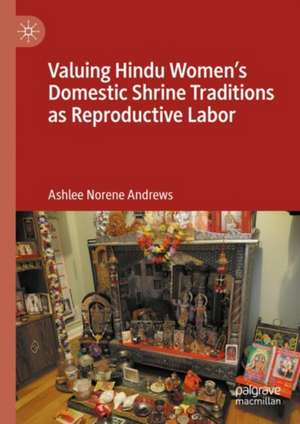Valuing Hindu Women’s Domestic Shrine Traditions as Reproductive Labor
Autor Ashlee Norene Andrewsen Limba Engleză Hardback – 20 oct 2024
Utilizing a years-long ethnography with Bengali American Hindu women, and drawing from Marxist feminist Social Reproduction Theory, this book argues that domestic shrine traditions are reproductive labor that is essential to the transnational and transgenerational sustenance of Hindu traditions and subjectivities. As the first monograph focused on Hindu women’s domestic shrine traditions in the United States, this book illuminates both the value of these traditions for the women who maintain them, and how these traditions connect immigrant Hindus to family and ethno-religious identity in ways unmatched by the public Hindu temple or organization.
Preț: 891.17 lei
Preț vechi: 1086.79 lei
-18% Nou
Puncte Express: 1337
Preț estimativ în valută:
170.52€ • 185.81$ • 143.69£
170.52€ • 185.81$ • 143.69£
Carte tipărită la comandă
Livrare economică 23 aprilie-07 mai
Preluare comenzi: 021 569.72.76
Specificații
ISBN-13: 9783031685088
ISBN-10: 3031685083
Pagini: 256
Ilustrații: Approx. 255 p. 15 illus.
Dimensiuni: 148 x 210 mm
Greutate: 0.45 kg
Ediția:2025
Editura: Springer Nature Switzerland
Colecția Palgrave Macmillan
Locul publicării:Cham, Switzerland
ISBN-10: 3031685083
Pagini: 256
Ilustrații: Approx. 255 p. 15 illus.
Dimensiuni: 148 x 210 mm
Greutate: 0.45 kg
Ediția:2025
Editura: Springer Nature Switzerland
Colecția Palgrave Macmillan
Locul publicării:Cham, Switzerland
Cuprins
Introduction.- Chapter 1.“I Just Do What Feels Right”: Valuing Domestic Shrine Traditions as Affective Labor and Women as Devotional Authorities.- Chapter 2. “It’s A Connection”: Valuing Domestic Shrine Traditions as Relational Labor And Sustaining Ethno-Religious Subjectivities and Traditions in the U.S..-Chapter 3. "It’s All About Me Because My Children Are the People That I Care For": Valuing Domestic Shrine Traditions as Maternal Labor and Rethinking Maternal Sacrifice.- Chapter 4. “I Don’t Need To Sit In Front of Any Kind of Deity”: Rejecting Domestic Shrine Traditions as a Chore and Negotiating Domestic Labor.- Chapter 5. “You Take the Best of Both Worlds”: Valuing Domestic Shrine Traditions as Homemaking Labor and Remaking Hindu Womanhood.- Conclusion.
Notă biografică
Ashlee Norene Andrews is Assistant Professor of Religion at University of North Carolina, Greensboro, where she primarily teaches courses on Hindu traditions, theories of religion and gender in religion.
Textul de pe ultima copertă
Historically in middle-class Bengali Hindu households it has been the matriarch’s responsibility to arrange and maintain the domestic shrine and to perform daily rituals of deity worship and caretaking—termed in this book as domestic shrine traditions. These traditions are often assimilated with the other domestic caretaking labor women are expected to complete for their families.
Utilizing a years-long ethnography with Bengali American Hindu women, and drawing from Marxist feminist Social Reproduction Theory, this book argues that domestic shrine traditions are reproductive labor that is essential to the transnational and transgenerational sustenance of Hindu traditions and subjectivities. As the first monograph focused on Hindu women’s domestic shrine traditions in the United States, this book illuminates both the value of these traditions for the women who maintain them, and how these traditions connect immigrant Hindus to family and ethno-religious identity in ways unmatched by the public Hindu temple or organization.
Ashlee Norene Andrews is Assistant Professor of Religion at University of North Carolina, Greensboro, where she primarily teaches courses on Hindu traditions, theories of religion and gender in religion.
Utilizing a years-long ethnography with Bengali American Hindu women, and drawing from Marxist feminist Social Reproduction Theory, this book argues that domestic shrine traditions are reproductive labor that is essential to the transnational and transgenerational sustenance of Hindu traditions and subjectivities. As the first monograph focused on Hindu women’s domestic shrine traditions in the United States, this book illuminates both the value of these traditions for the women who maintain them, and how these traditions connect immigrant Hindus to family and ethno-religious identity in ways unmatched by the public Hindu temple or organization.
Ashlee Norene Andrews is Assistant Professor of Religion at University of North Carolina, Greensboro, where she primarily teaches courses on Hindu traditions, theories of religion and gender in religion.
Caracteristici
Illuminates the role of domestic religiosity Analyzes women’s domestic ritual as a form of reproductive labor Contributes new and vital content to conversations about the inequitable labor burdens that women and mothers bear
